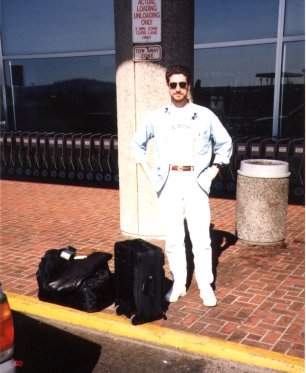July 25, 1994. Boxing up a two-bedroom apartment is no small task. I have been working away at it for a week, one room — or a portion of a room — at a time. Yesterday I finished the kitchen. Today I am working on my office. I can spend days neatly packing things into boxes, and then whisk it all down to the self-store in half an hour.
My apartment is a complete mess. Every flat surface — tables, counters, bed — is strewn with orphaned knickknacks, books, papers, old clothes I should have thrown out long ago, things that weren’t valuable enough to make it into the boxes. In seven days, this apartment will be empty. The walls will be bare, the carpets cleaned, the furniture gone; just like the day I moved in, as if I had never lived here at all. Two weeks from now, someone else will live here and call it home. Someone else will own the Honda I have been driving for nine years, and they will call it theirs. Someone else will step in to fill whatever vacuum I am leaving in Portland.
Don’t You Worry ‘Bout a Thing
I awoke last night at four AM, startled by the thought that I will be leaving in one week. In one week I will be on a plane from Seattle to Copenhagen and then another plane from Copenhagen to Tallinn, Estonia. The thought would be exhilarating if I were looking forward to a simple vacation. Knowing that I am leaving the United States for up to a year is downright scary. A thought like that can give you a jolt of adrenaline strong enough to wake you from a sound sleep.
Another recurring thought I am having is about the safety of traveling in these countries. I am told that Poland is very dangerous right now. The people are extremely poor and crime is escalating. Car theft and robbery, even highway banditry, are apparently a problem. Friends from Poland have told me that now is a bad time to go there. In Russia, newspapers report that “gangsters” are riding the overnight trains and breaking into sleeper cars to rob the passengers. Today I read that the Matyas Templom (Matthias Church), one of Budapest’s most popular tourist attractions, was bombed earlier this week. No one was hurt, but several stained glass windows and parts of the building were damaged. I am reminded, though, of the scare in Florida last year when several German tourists were killed. Florida tourism dropped sharply as most European travelers made other plans. Despite the bad publicity that Florida got in Germany, I expect that, overall, Florida is still a safe place to visit. Maybe this is a good analogy, maybe it isn’t. It is at least comforting. I will know more when I get there.
Thanks for the Memories
For the last few days I have been reading a travelogue by Evelyn and Mark Leeper, an American Jewish couple from New Jersey who document their travels so thoroughly, I find myself wondering how they still have time to see anything. This year they began their travels in the Baltic states. Their description of a few weeks in these three small countries fills nearly a hundred pages. They were kind enough to email me the Baltic portion of their travelogue. I will surely be indebted to them for their insights and their verbosity. I must also acknowledge David Loftus and his wife Carol who shared with me their pictures from a recent three-week trip to Estonia, and told me about their experiences. Their beautiful photographs have made me eager to start.
Whoops, Here It Is!
 |
August 1, 1994. I am very tired. I can’t tell if the tiredness is from a full day of moving furniture yesterday, or if it is the emotional toll of leaving home. I am surprised at the number of people who are crying as they board the plane. They kiss their friends and relatives tearfully at the gate, clearly unhappy to be leaving. I guess I am not the only one who finds this draining. Perhaps I am naive, but I didn’t expect to feel sad about leaving.
Another surprise is the number of Internauts — presumably readers of soc.culture.baltics — who sent email to wish me well or offer helpful suggestions the last day or two before my trip. I believe there is something exaggeratory about cyberspace. In cyberspace, people have fewer inhibitions and fears about talking with complete strangers. As a result, angry, spiteful people become more outspoken and confrontational, while kind and generous people will often go out of their way to be helpful. |
It’s my turn to get on the plane. The flight is now boarding and the announcer has called out my row. Now the trip begins.
Copyright © 1994, Kenn Nesbitt

![[Previous]](https://poetry4kids.com/travel/PREVBTN.gif)
![[Next]](https://poetry4kids.com/travel/NEXTBTN.gif)




